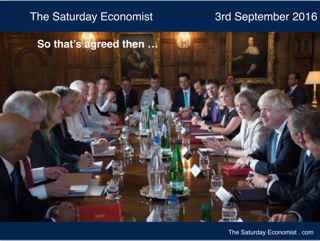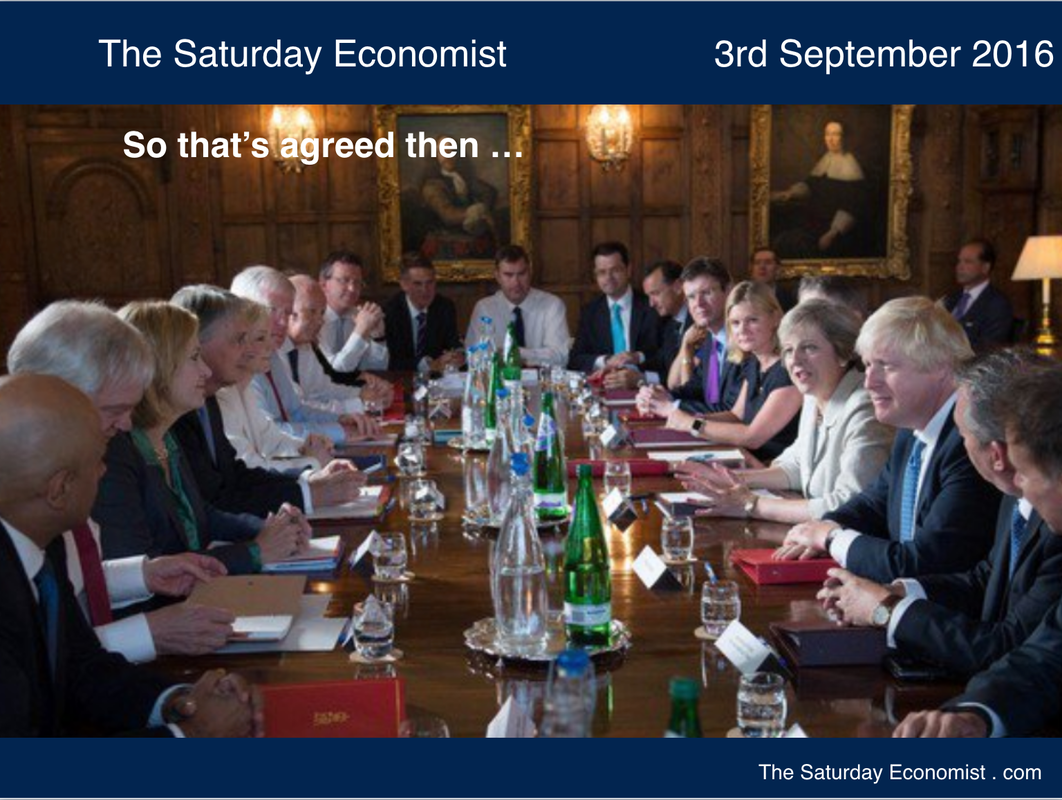 Business as usual … Status Quo Ante Referendum … Fears the Brexit vote would cause an immediate downturn in the economy were diminished this week. The UK economy is performing much better than expected two months after the vote. For readers of the Saturday Economist, the data should come as no surprise. The move to leave the EU will create problems for the UK economy but not for some years yet. Cabinet met this week to formulate the definition of "Brexit means Brexit" and the terms by which we shall leave the EU. The task to square the circle, La Quadrature du Cercle, Das Quadratur des Kreises continues. It is a tough challenge in any language. It is, as we shall realise, for others within the EU to determine that which may be achieved. History explains the retreat from Dunkirk is not the time to review the terms of surrender of the German Army. The Tories will tear themselves apart in the process. Boris Johnson has broken ranks this week. So much for collective cabinet responsibility and the uniform view within government. Meanwhile … PMI Markit Series Manufacturing and Construction … In the UK the latest information from the PMI Markit series for August confirms the July data was a wobble. The UK manufacturing index hit a ten month high in the month. The index climbed to 53.3 as output and orders increased significantly. The PMI Markit construction index jumped to 49.2 from the prior month low of 45.9 as activity in housing and commercial property rallied. Consumer Confidence … Consumer confidence increased according to the latest data from GfK in August. Consumers are more inclined to spend than save. Overall confidence in the economy over the next twelve months increased by 11 points. House Prices Nationwide … House prices increased by 5.6% in August up from 5.2% prior month according to Nationwide. Housebuilding shares rallied as Persimmon followed Taylor Wimpey and Bovis Homes confirming sales were unaffected by the referendum result. The volume of activity remains low as buyers digest the impact of stamp duty and conflicting signals from the Bank of England. Property better than pensions … The Governor warned last month, house prices were likely to fall in the near future. Andy Haldane Chief Economist at the Bank gave the market a boost this week, suggesting individuals should invest “in property rather than pensions”. Property offers a better return than savings. Especially since “we have blown the biggest bond bubble in history” he should have added. It is clear the Bank of England moved too soon to cut rates and to increase the QE purchase programme. It is hard to understand why the Bank of England embarked on Corporate bond purchases. There is neither liquidity nor funding problem. The search for Alpha is difficult enough. Corporate bond yields offer attractive returns compared to government gilts. State induced buying programmes will diminish rather than enhance returns to investors and pension funds. The move to the zero bound and QE is mispricing capital in a capitalist system. It is a huge mistake. Mis priced capital is destroying the gilt curve, pushing ten year yields below 1%. The move hits savers and exacerbates pension fund deficits. The move to negative yields will force banks to penalise deposits so essential to maintain lending levels. Stock markets have benefited from the rise in investment volumes in the search for yields and dividends. But dividends are at risk from the continued programme of Central Bank intervention. Distress calls on Planet ZIRP ... A distress call was heard on Planet ZIRP this week. Dividends will be at risk from pension fund deficits. Phil Aldrick writing in the Times this week reviewed the position of Carclo. Carclo a plastics manufacturer has had to scrap it’s dividend. Under UK law, companies are not allowed to pay dividends if they have no distributable reserves. Accounting rules state that pension deficits, count against the reserves. Despite cash in the balance sheet, the company was legally restricted from making the shareholder payout because of the long term pension fund deficit. Others may have to follow suit. The combined deficit of the UK’s pension funds has risen to £710 billion according to PwC’s SkyVal Index. Around the world, $13 trillion of global and corporate bonds have negative rates. Denmark mortgages carry negative rates Japan is committed to buying 6 Trillion yen this year of further bonds. When something cannot go on forever, it will stop. Low rates in perpetuity or unhealthy and unsustainable. The bond market looks like a speculative bubble set to pop. If dividends are slashed as a result of QE what then of stock markets set to move to new highs in the UK and the U.S. No talk of this in Jackson Hole last week. Central bankers seem to believe QE and FG will be the salvation of any future crisis. More of the same is not the real game. Collective co-ordinated action amongst the G20 is required to escape from Planet ZIRP. The locomotive theory of monetary policy is required to effect the “Great Escape”. Central bankers must move together to hike rates if the crisis is to be avoided. So what happened in the U.S.A. Soft jobs data in August suggests the next rate rise in the U.S. will have to wait until December at best. Non farm payrolls increased by 151,000 in the month. The Fed is inclined to hike rates. The unemployment rate remained at 4.9%. Latest job data and weak growth in Q2 will mean the escape from Planet ZIRP is on hold for the moment. So what happened to Markets? Markets, were mixed - The Dow closed at 18,016 from 18,541. The FTSE closed up at 6,894 from 6,845. Sterling moved up against the Dollar to $1.330 from $1.3201 and moved up against the Euro at €1.192 from €1.170. The Euro moved down against the Dollar to 1.116 from 1.128. Oil Price Brent Crude closed at $46.91 from $48.56. The average price in September last year was $46.52. Gilts - yields moved up. UK Ten year gilt yields closed at 0.75 from 0.55. US Treasury yields moved to 1.62 from 1.56. Gold closed at $1,321 from $1,347. John That's all for this week ... if you enjoy The Saturday Economist .. JOIN THE SATURDAY ECONOMIST CLUB as an INDIVIDUAL or CORPORATE member. Check out the link for lots of options to get involved. Special reports, Survey Results and the Quarterly Economic Outlook are made available to members and sponsors. Plus priority booking for the quarterly events and discounts on the Economics Conference! Join and Save! Join The Saturday Economist Club as an Individual or Corporate Member ... © 2016 John Ashcroft and Company, Economics, Strategy and Social Media, experience worth sharing. ______________________________________________________________________________________________________________ The material is based upon information which we consider to be reliable but we do not represent that it is accurate or complete and it should not be relied upon as such. We accept no liability for errors, or omissions of opinion or fact. In particular, no reliance should be placed on the comments on trends in financial markets. The receipt of this email should not be construed as the giving of advice relating to finance or investment.. ___________
0 Comments
Leave a Reply. |
The Saturday EconomistAuthorJohn Ashcroft publishes the Saturday Economist. Join the mailing list for updates on the UK and World Economy. Archives
July 2024
Categories
All
|
| The Saturday Economist |
The material is based upon information which we consider to be reliable but we do not represent that it is accurate or complete and it should not be relied upon as such. We accept no liability for errors, or omissions of opinion or fact. In particular, no reliance should be placed on the comments on trends in financial markets. The presentation should not be construed as the giving of investment advice.
|
The Saturday Economist, weekly updates on the UK economy.
Sign Up Now! Stay Up To Date! | Privacy Policy | Terms and Conditions | |

 RSS Feed
RSS Feed